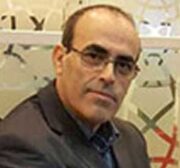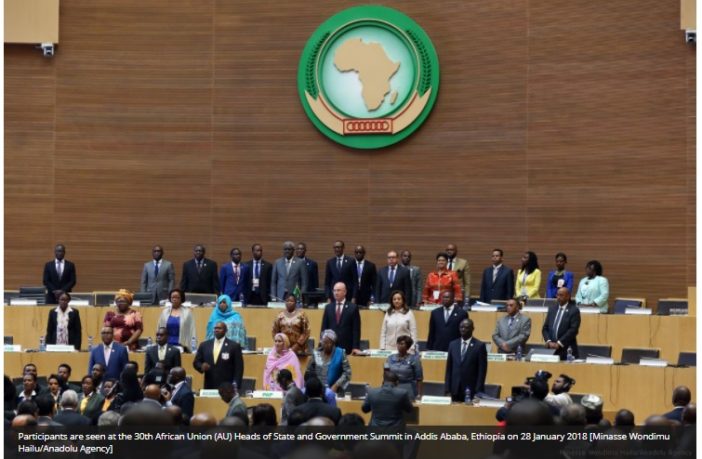Middle East Monitor
According to specialist news reports, Algeria has failed to nominate any candidates for key positions in the African Union. Seven positions are open to change, the most important of which is the Commissioner of the Peace and Security Department (PSD), which Algeria has held since 2008. It was held first by Ramtane Lamamra and then Smail Chergui, the former Algerian ambassador in Moscow.
French news site Africa Intelligence is following this issue closely and said that Algeria was apparently late in nominating a candidate to succeed Chergui for two reasons: the dissatisfaction of many African Union member states with Algeria’s domination of the position; and the differences between Prime Minister Abdelaziz Djerad and Foreign Minister Sabri Boukadoum which prevented any agreement on a specific candidate. The situation was exacerbated by the failure of Algeria’s President Abdelmajid Tebboune to intervene.
While the first reason may be somewhat acceptable, it is difficult to believe that a matter of such sensitivity and importance was left in the hands of a prime minister with limited constitutional powers, and a foreign minister, regardless of his competence. Such things are usually managed by the President of the Republic, and in many cases they are managed by what the late Abdelhamid Mehri called “the actual authority”.
READ: Algerian women push for more rights at Berber soccer tournament
Algeria not only gave up the position of Commissioner of the PSD, but also failed to nominate candidates for any of the other six positions. Into this Algerian void stepped Morocco which put candidates forward for all of the posts. However, none of the Moroccan candidates have any chance of being appointed, except for one; Mohamed Sadiki is a candidate for the post of agriculture and rural development commissioner.
It is not definite that Algeria worked behind the scenes to block Morocco’s candidates, but Rabat feels that this is the case and is upset about it. What is certain, according to Africa Intelligence, is that Algeria has its eyes set on the General Secretariat of the PDF, which is a powerful role for which Algiers is likely to nominate Abdelkader Araoua.
It seems that one of the reasons for the Moroccan “failure” is Rabat’s relative lack of experience in waging diplomatic backroom battles in comparison with Algeria. However, Africa Intelligence believes that this is because, “Morocco’s campaign was not run by foreign minister Nasser Bourita but by Yassine Mansouri, head of the DGED external intelligence service.” Ironically, the Moroccan candidates’ files were transferred to the African Union Legal Counsel Office, which is headed by Lamine Baali, representative of the Sahrawi Arab Democratic Republic.
Regardless of the details, winning key positions provides countries and governments with the kind of influence and power that traditional diplomacy cannot. With wars and crises dominating the African continent, the PSD commissioner will remain the strongest and most important role. The turmoil puts AU commissioners, especially the head of the PSD, in contact with world leaders, and imposes them as direct negotiators with countries and organisations interested in Africa regionally and internationally.
Algeria: Western Sahara conflict is a colonialism issue
Africa is no longer that neglected space on the maps of international concerns. Its enormous natural wealth; its capacity as a huge consumer market; its constant proneness to wars and crises; and the growth of international terrorism are all factors that make it the centre of international attention from the former colonial powers, the European Union and America. Latterly it is also of great interest to the rising powers of China, Russia, Turkey and India.
The African Union is making its voice heard in the issues that concern it. For example, the AU is now trying to present an African candidate to succeed America’s Stephanie Williams as deputy head of the UN Support Mission in Libya when her duties end next month. The only candidate so far is Bulgaria’s Nikolay Mladenov, the UN envoy to the Palestinian-Israeli conflict, but the AU rejects him despite US support and the lack of European objections.
Across the continent, there are at least ten countries that will witness presidential or parliamentary elections, or both, within the next six months. These are Guinea, Tanzania, Ivory Coast, Burkina Faso, Niger, Liberia, Benin, Uganda, Seychelles and the Central African Republic. Many of these elections will take place in an atmosphere fraught with tension and popular rejection of the candidates or of the way that the polls are organised. The results of some are already being rejected by the people and may lead to civil strife.
READ: Morocco court orders bank to cash cheque written in Tamazight
Africa, which in the past two decades has made some democratic progress, is entering a period of relapse, which the hardened Arab dictators envy. The same leaders who led African countries towards democracy have turned into dictators who refuse to leave their positions. With the exception of Niger, all the heads of the countries due to hold elections are candidates to remain in office, despite popular rejection and not meeting legal and constitutional conditions. In Guinea and Ivory Coast, for example, democratically-elected Presidents Alpha Conde and Alassane Ouattara have tampered with the constitutions to stay in power. In Uganda, President Yoweri Museveni, 77, is working to win a new term in the post that he has held since 1986.
All of this reveals that it is very tempting to compete for senior AU positions. The union has 55 member states, but influence and key roles are confined to a handful, and there is a growing trend to attract new members to the influence club and to persuade others to step down. However, it seems that the balance of power between the members of this club is preserved because each one needs the others in some way, or knows that this will be the case in the future. Competition between Algeria and Morocco has thus exposed the closed shop nature of influence within the African Union.
Translated from Al Quds Al Arabi, October 2020
The views expressed in this article belong to the author and do not necessarily reflect the editorial policy of Middle East Monitor.








